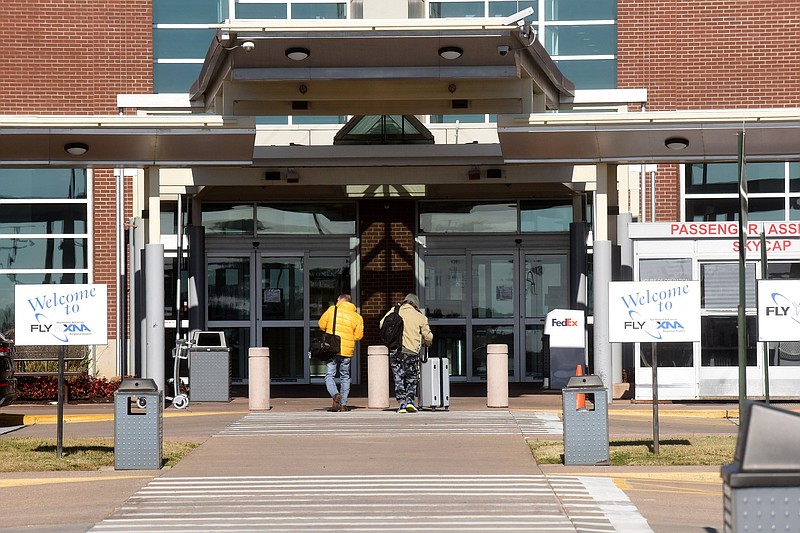HIGHFILL -- The airport authority board Wednesday asked staff to analyze parking rates and recommend adjustments for inflation.
"Inflation has hit everything. It's hit our costs; it's hit everybody's costs," said Aaron Burkes, chief executive officer of Northwest Arkansas National Airport. "This would be very significant to us from a revenue standpoint. Bumping up the parking fees by even a buck or two could add $1 million to our bottom line."
Parking rates, traditionally one of the biggest revenue sources for the airport, haven't increased in years. Now inflation is taking a bigger bite, making it more costly to operate, according to Burkes. Parking generated $6.9 million in revenue in 2019, up from $5.4 million in 2018. Parking revenue fell during the pandemic, when fewer people were flying. Parking generated $5.2 million last year and is expected to generate slightly more this year.
"We're potentially leaving a lot of money on the table, and I think everybody expects prices to be up; our costs are up," Burkes said. "Nobody expects 2018 prices or 2016 prices for anything anymore."
A cursory look by staff indicates adjusting for inflation would increase the cost of per-day parking about 20%.
"We're not 100% ready to make a recommendation simply because we haven't assimilated and analyzed all the data yet," Burkes said. "We're still pulling it together. I would envision it probably being pretty close to in line with the inflation adjusted rate."
Jonathan Barnett, a board member representing Benton County, said he'd like to try to hold the costs down for economy parking but urged staff to bring back a recommendation soon.
"I recommend you get it done because inflation is going to stay with us," he said.
The airport is quickly approaching prepandemic passenger numbers based on Transportation Safety Administration data. In May, passengers were down 2.1% from 2019 numbers, according to preliminary counts.
Airport officials use 2019 for comparisons because it was the last year before the covid-19 pandemic devastated the airline industry. XNA was down about 95% from record 2019 numbers at one point in early 2020, but passengers have mostly increased since then.
"It's a beautiful chart in that it's a very consistent return to the 2019 numbers," Burkes said. "No real gyrations. During the last covid surge we saw a little bit of a decline in our numbers, but other than that, it's just been very steady."
Burkes said a shortage of pilots, reduced seat capacity by airlines, a doubling of jet fuel costs and extremely high demand for travel all mean higher ticket prices for the foreseeable future as airlines try to make up for revenue they lost during the pandemic. Burkes said increases of up to 40% would not be surprising.
"All of that is, obviously, leading to higher fares," Burkes said.
Airport officials have repeatedly made the point they have nothing to do with the cost of fares, which are set by the airlines.
Burkes said airlines are about 12,000 pilots short this year alone. Airlines are trying to hire and certify more, but it could be a five-year problem, he said. A lot of pilots retired during the pandemic, when people just were not flying, and airlines reduced the number of planes on their routes, according to Burkes.
"It's just a long process to fill up the pipeline again," Burkes said. "We were short going into it, and it just exacerbated it with the pandemic and all those effects. In the meantime, with demand strong, fares are just going to be high. It's simple economics."
Burkes said high fuel costs are adding about $20 per seat, one way.
The net result has been a 40% increase in airfares nationwide this year, he said.
More News
NoneCapturing the market
Northwest Arkansas National Airport is not losing as many flyers to other nearby airports as it once did. In 2013, XNA retained about 61% of the flying public from the region. This year, that figure is about 75%. The airport’s catchment area — the area from which the airport can reasonably expect to draw commercial air service passengers — spans from Mountain Home into eastern Oklahoma and from Joplin, Mo., to Fort Smith.
Source: Northwest Arkansas National Airport

